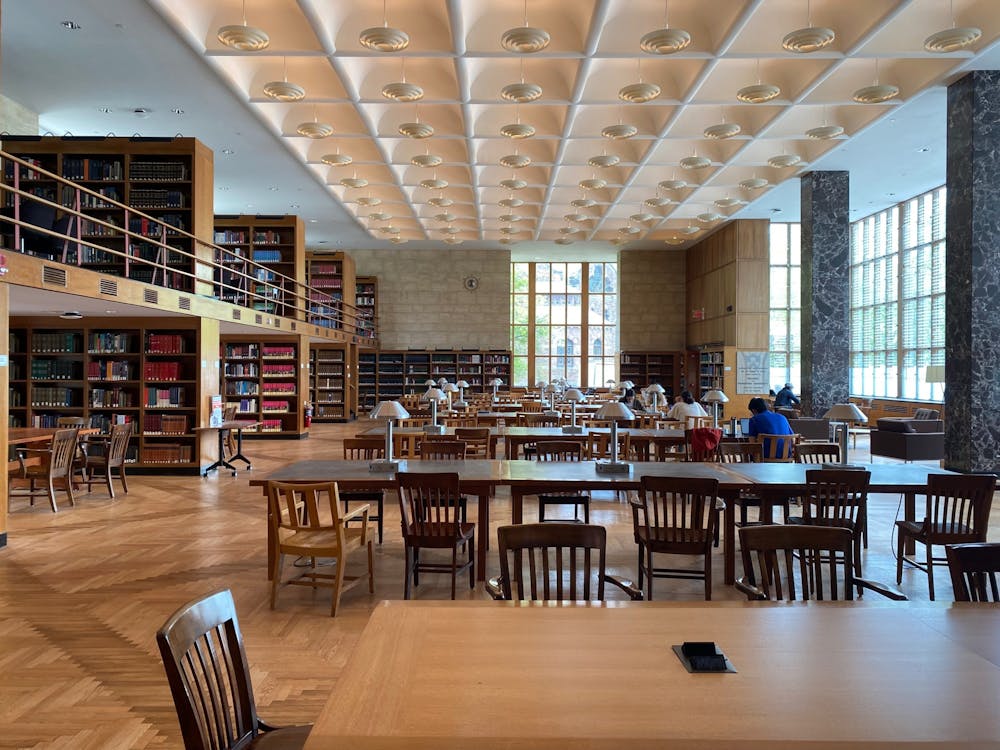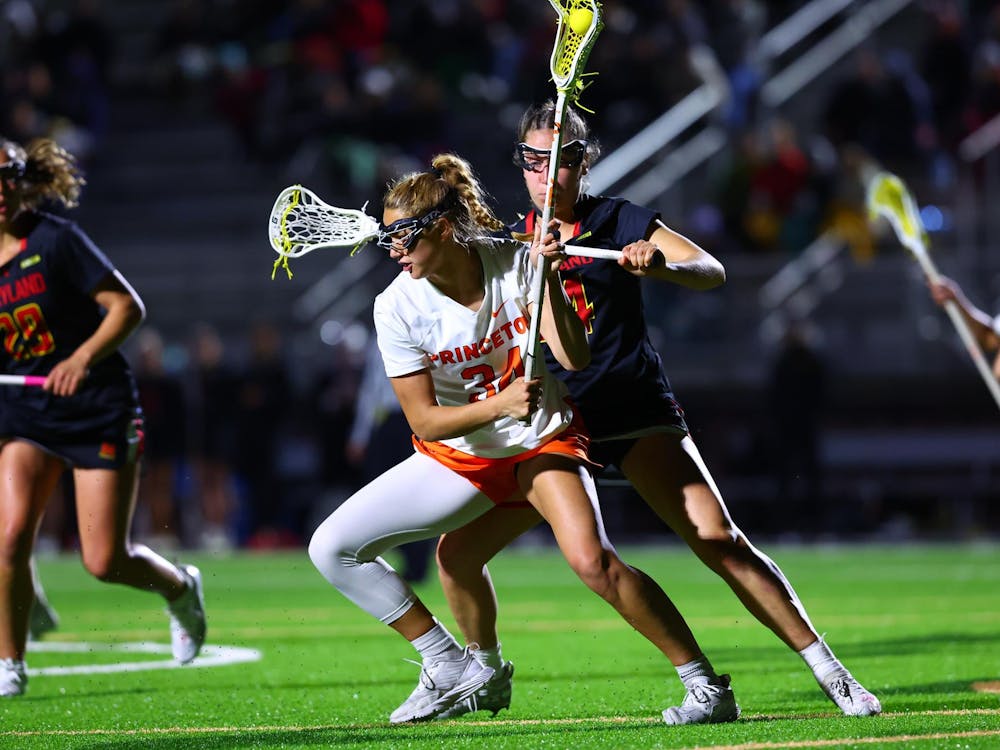When I gave campus tours during my first-year summer, I first explained the senior thesis by intimidating prospective students: it’s a 70-to-100-page behemoth on a topic entirely of their choosing, as traveling to great lengths and conducting deep research to defend your arguments is expected of (roughly) all Princeton students. Properly worried, one could then explain how the University actually prepares you for that process. During writing seminar in your first year, you become familiar with the conventions of research standards. Then after some exploration sophomore year, you get to focus your writing in a junior paper or two — challenging, but not overwhelming efforts that ultimately prepare you to tackle the greater task. I would feel an exhale from the group after providing that reassurance, which I gave with false confidence as if I knew then what it meant to live through it.
For what it is worth, to any University faculty and administrators reading this, I do not wish to discount the significance of the thesis to your program. Indeed, I feel I have gained much from the process. I do feel my abilities in research and writing have improved much through it, and I have learned a lot about a topic I feel is of great importance. And all of that work resulted in a tangible product I can present as proof of my ability, to impress whomever I might need to with it. I will no doubt reap benefits from writing this thesis, but let me be clear that this has come at its own cost.
Those costs are themselves almost an open secret, something you recognize, but don’t fully appreciate until you’ve been through it. As an underclass student, you know it’s a lot to endure. Your senior friends largely disappear in the spring. When you do see them in the weeks before their deadline, you can see how frazzled and stressed and sleep-deprived they are. But after it’s done — they’re done! Having crossed the final barrier and entered the promised land of ‘PTL,’ they return back to reality more accomplished than ever before.
But what does it take to get there? Well, it’s not a uniform experience, but an academic advisor once warned me ahead of time how isolating it was going to be. In the months leading up to their deadlines, friends privately discussed the sense that they would fail expectations, panic attacks, depression, and overwhelming stress. People struggled to sleep, to eat, to clean, to take care of themselves. All of this amplifies in the final weeks, as seniors skip classes and forgo other obligations to ensure they make it to the deadline with presentable work.
For me personally, the final week leading up to my deadline was marked with an overwhelming sense of stress, anxiety attacks, and only about three hours of sleep in the 80 hours before my deadline. I seriously questioned my own abilities. My mind was filled with thoughts of doubt and failure: drop out now, spare this school the trouble of reading your academic vomit, I thought. What beautiful lies I must have told to have been admitted as a student here at all!
In spite of all that, I submitted a thesis — two hours ahead of its due time. I had been told by professors and alumni friends of the relief that would wash over me when I was done: the joy of entering PTL. But when I finished, the stress did not vanish. My exhausted body twitched and shuttered. I wandered campus in a trance, desperate to find the promised relief. I ran into friends, who congratulated me as I would do to them in kind, but still felt nothing. The numbing sensation in my brain did not depart so easily. My lips were dry and breaking; it hurt then to open my mouth to eat. In the week after that time, I came back to some sense of myself, but still, the semester was not done. I was the wick of a candle, miraculously regrown from nothing, but asked to burn again.
And perhaps it is my fault. Surely, there must have been a way for me to better prepare for this, better balance my work such that I need not compromise my health and wellbeing — the University seems insistent that it is possible. While I am sure there are some who may manage this work in healthy ways, I feel it is not controversial to say this is hardly the common thesis experience. Perhaps recent class years in particular have been damned by circumstance. The intended compounding preparation of our four years was thrown out of the window by the impacts of the COVID-19 pandemic. But I would argue that the past 26 months have only exacerbated the human impacts of the independent work program. The negative effects of the thesis process have been experienced by countless before us and will likely continue to seriously affect students in the future without any reevaluation of the University’s structure and how it considers student wellbeing.
I think any proposed changes to better secure student well-being in the independent work process would face resistance, in part because of the mythologized state of PTL: the expected sense of accomplishment, celebrations by departments and student organizations, and all the excitement around Reunions and Commencement. This month-or-so period where seniors are to be celebrated, in addition to the earlier stated long-term benefits of the thesis, feels as if it is meant to make up for what one endures to get here. You suffer in exchange for a Princeton-level pay-off.
This transactional perspective hardly feels right, in no small part because I believe it discounts how the impacts of the thesis linger. Stress now — academic or otherwise — intensely reminds me of how awful I felt back then, and in the night before the oral presentation of my thesis, I was plagued once again by anxiety about the work and thoughts that it had been a failure, a complete waste of everyone’s time.
The scab on my lip has yet to fully heal, even a month later. The detriments of this time do not leave so quickly and are not resolved so easily with celebration. But even if one was fully “compensated” — to put it one way — for what they went through in the research and writing process, does that make it right that one had to endure it in the first place?
I think of it like this: Could I send my child to Princeton? Encourage them to follow in my footsteps, strive to experience the same magic I found in this institution, knowing the kind of suffering they might have to endure from the expectations of the program?
I don’t know.

All I can say now is that I am through it, for better or worse. And having finished the last of my academic work, all that’s left for me at The Best Damn Place of All is the people I have come to know, and the memories yet to make as we close out our time here. I hope this time can be one that does find truth in the myth of PTL — that it is filled with joy and excitement, particularly in a Reunions long deferred.
But I also hope this time is not one solely of celebration. It is a hope for myself, my peers in the Class of 2022, and all whom I’ll get to see in the next two weeks that in coming together, we may all also find a way to heal from all that we have endured.
Chris Leahy is a guest contributor and senior of SPIA from Galesburg, Ill. You can contact him at cpleahy@princeton.edu, until his Princeton student email is deactivated later this summer.
Self essays at The Prospect give our writers and guest contributors the opportunity to share their perspectives. This essay reflects the views and lived experiences of the author. If you would like to submit a Self essay, contact us at prospect@dailyprincetonian.com.









